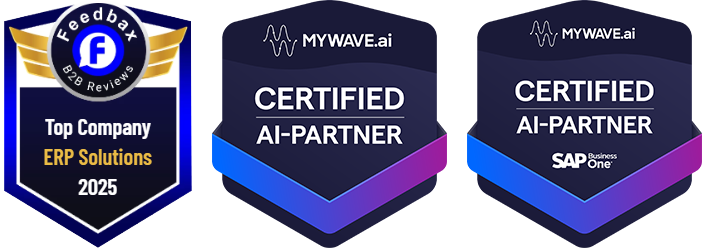
How Role-Based Access and Multi-Factor Authentication Work in SAP Business One Cloud Environments
- Role-Based Access Control (RBAC)
- Multi-Factor Authentication (MFA)
Why Security Is Essential in Cloud ERP
With SAP Business One hosted in the cloud, access extends beyond the walls of your office:- Employees connect from multiple devices and locations.
- Sensitive financial and operational data travels across networks.
- System integrations introduce third-party touchpoints.
- User Groups and Roles Admins define user roles (e.g., Sales Manager, Accountant, Warehouse Clerk). Each role is assigned a specific set of permissions.
- Authorization Objects SAP B1 uses authorization objects to control access to modules like Sales, Purchasing, Finance, and Inventory.
- Granular Control Permissions can be defined down to the transaction level, such as:
- Viewing sales orders
- Approving purchase requests
- Modifying customer records
- Inheritance and Hierarchy Roles can inherit permissions, making it easy to onboard or promote users without manual reconfiguration.
- Custom Role Definitions Admins can create hybrid roles based on real organizational structures. For example, a Regional Sales Manager might need full access in one location and read-only in others.
- Prevents unauthorized access
- Minimizes human error
- Enables audit readiness for standards like GDPR or ISO 27001
- Simplifies user management as teams grow
- Single Sign-On (SSO) via Identity Providers (IdPs)
- VPN gateways with MFA
- Custom-developed MFA plugins or wrappers
- TOTP-based apps (e.g., Google Authenticator, Microsoft Authenticator)
- SMS or Email OTPs
- Biometric Authentication (via integrated IdP like Azure AD)
- Hardware Tokens (YubiKey, RSA SecureID)
- SSO Integration with Identity Providers
- Setting up SAML 2.0 authentication
- Mapping SAP user IDs to the identity provider
- Enforcing MFA policies via the IdP dashboard
- Remote Desktop Gateway with MFA
- A pre-login MFA prompt (e.g., Duo MFA)
- Integration with Windows Hello for Business
- Conditional access policies (device location, IP address)
- VPN with MFA
- Fortinet
- Cisco AnyConnect
- OpenVPN with MFA plugins
- SAP Business One Cloud hosted on Microsoft Azure
- Integrated with Azure Active Directory
- MFA via Microsoft Authenticator
- RBAC with predefined roles for Finance, Operations, Sales
- Remote employees use SSO + MFA to access SAP securely from anywhere.
- Only the CFO can approve supplier payments.
- Warehouse staff can view but not edit sales reports.
- Monthly access logs support ISO 27001 audits.
- Use a Centralized Identity Provider (IdP) Connect SAP Business One to an IdP like Azure AD to enforce organization-wide access policies.
- Follow the Principle of Least Privilege Start with the minimum permissions and grant additional access only as needed.
- Audit User Activity Regularly Track changes, login attempts, and unauthorized access.
- Enforce Strong Passwords + MFA Passwords alone are no longer sufficient. Add at least one secondary factor.
- Keep Role Definitions Updated Roles should evolve as your business does—review them quarterly.
- Work with a Certified SAP Partner A professional SAP agency in Berlin like Ingold Solutions can handle secure configurations, role setup, and seamless MFA integration.
- Understanding your business processes
- Mapping users to correct roles
- Choosing the right MFA tools and integration path
- Testing, logging, and policy enforcement
- Cloud migration support
- Ongoing user training
- Compliance audits
- 24/7 technical support






 Applicable for Package
Applicable for Package Optional
Optional